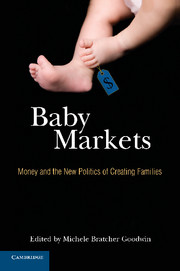Book contents
- Frontmatter
- Contents
- Preface
- Acknowledgments
- Introduction
- PART ONE WHAT MAKES A MARKET? EFFICIENCY, ACCOUNTABILITY, AND RELIABILITY OR GETTING THE BABIES WE WANT
- PART TWO SPACE AND PLACE: REPRODUCING AND REFRAMING SOCIAL NORMS OF RACE, CLASS, GENDER, AND OTHERNESS
- PART THREE SPECTRUMS AND DISCOURSES: RIGHTS, REGULATIONS, AND CHOICE
- PART FOUR THE ETHICS OF BABY AND EMBRYO MARKETS
- PART FIVE TENUOUS GROUNDS AND BABY TABOOS
- Author Bios
- Index
Preface
Published online by Cambridge University Press: 05 August 2012
- Frontmatter
- Contents
- Preface
- Acknowledgments
- Introduction
- PART ONE WHAT MAKES A MARKET? EFFICIENCY, ACCOUNTABILITY, AND RELIABILITY OR GETTING THE BABIES WE WANT
- PART TWO SPACE AND PLACE: REPRODUCING AND REFRAMING SOCIAL NORMS OF RACE, CLASS, GENDER, AND OTHERNESS
- PART THREE SPECTRUMS AND DISCOURSES: RIGHTS, REGULATIONS, AND CHOICE
- PART FOUR THE ETHICS OF BABY AND EMBRYO MARKETS
- PART FIVE TENUOUS GROUNDS AND BABY TABOOS
- Author Bios
- Index
Summary
Applying the laws of supply and demand to babies and children attracted strident criticism thirty years ago, when a University of Chicago Law School professor and an emerging business scholar penned a provocative article titled “The Economics of the Baby Shortage.” The article was dismissed as an outrageous package of assumptions; children are not widgets or pieces of property to be reduced to economic analysis. Landes and Posner surmised that white babies were in demand, but that we could all agree that there was a “glut of black babies” for adoption. They hinted that the surplus in black babies had something to do with “the very high ratio of illegitimate black births.” The article placed a spotlight on what they referred to as “baby selling,” which they claimed was already occurring. Landes and Posner described these transactions as “black market” exchanges because “public policy is opposed to baby selling.” Their article offered an elegant analysis of what critical legal scholars might have referred to as an emerging crisis: too many children, especially black babies, were in foster care, and most with no hope of ever being adopted.
But why the backlash? The Landes–Posner collaboration was, after all, grounded in strong empirics. To some, the thought of baby selling or baby markets rekindled images of slavery, which is considered by many the darkest period in U.S. history.
- Type
- Chapter
- Information
- Baby MarketsMoney and the New Politics of Creating Families, pp. x - xiiiPublisher: Cambridge University PressPrint publication year: 2010

